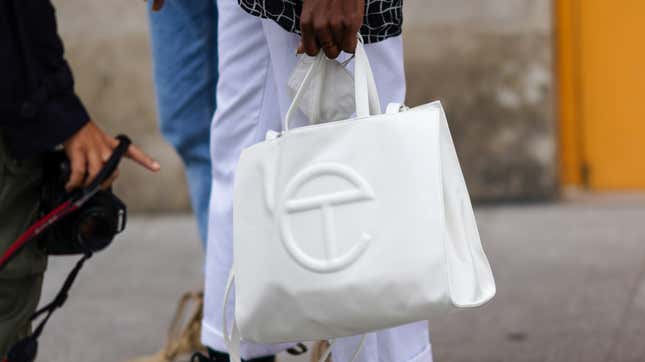
If you’re in the market, no doubt you dipped on over to Telfar Global’s site today to cop one of the designer’s coveted shopping bags though his “Bag Security II” program. After all, it’s one of the rare opportunities to pre-order the cult-favorite tote, circumventing the typical grab-one-while-they-last color-coded drops that typically result in disappointment, as they sell out in minutes.
But as has always been the trend in fashion, one hot trend immediately begets copycats—and with laws on plagiarism legendary for being loosely interpreted in the industry, there’s typically little to be done—that is, unless Black Twitter gets involved. Proving the power of what the New York Times coined “The Telfar Tribe,” when another major brand sought to capitalize off the brand identity Telfar has steadily built—it learned the hard way that his largely Black audience ain’t having it.
Per the Times on Monday:
[W]hen a handbag licenser for Guess, Inc. decided to create a bag that looked an awful lot like the Telfar shopping bag, perhaps the greatest hit handbag of the last year, it probably didn’t seem like a big deal. Even though the Guess version features such similar double handles, similar shape and similar logo — an embossed “G” in a circle, like the embossed T-within-a-C of Telfar. If you squint, you could get the two confused.
But they hadn’t reckoned with the Telfar tribe, or what the designer, one of the few Black creatives at the head of his own fashion brand, and his work have meant to so many.
While Telfar’s bag is beloved across the industry by influencers and fashion lovers of varied backgrounds, don’t get it twisted, anyone familiar with Black Twitter knows the tidal wave that can be created with a few online rallying cries. Prior to Guess, Gucci was one of many brands forced to reckon with accusations of appropriation when Creative Director Alessandro Michele riffed on vintage logo-laden designs by Dapper Dan in the luxury label’s Resort 2018 collection.
That blatant ripoff not only prompted the outrage of a predominantly Black fanbase of amateur fashion historians on social media, but ultimately resulted in a collaboration between the Italian legacy brand and the self-made Harlem designer. Dapper Dan now has a Gucci co-branded atelier in his native enclave, where he has helped revitalize the brand’s relevance for a new generation, in addition to spearheading Gucci’s efforts at creating more inclusion at both the label and industry at large as more gaffes continued. It was an expensive, albeit ultimately fortuitous mistake for the brand—but not one that bears repeating.
However, history taught Guess absolutely NOTHING, since it is now yet another company to lose countless dollars in product and manufacturing costs, after being compelled pulled its Telfar ripoffs from its retail channels on Sunday.
“Signal Brands, the handbag licensee of Guess, Inc., has voluntarily halted the sale of its G-Logo totes,” it said in a statement obtained by the Times, which continued: “Some on social media have compared the totes to Telfar Global’s shopping bags. Signal Brands does not wish to create any impediments to Telfar Global’s success and, as such, has independently decided to stop selling the G-logo totes.”
And Black Twitter triumphs, yet again.
Tastefully, designer Telfar Clemens and his creative director and business partner, Babak Radboy, let the brand’s following do the talking for them, entirely refraining from engaging in a likely expensive legal or even cultural battle with Guess in the midst of the controversy.
More from the Times:
At the time, Mr. Radboy said, he and Mr. Clemens had decided not to pursue any action, in part because they “weren’t afraid of it — and we didn’t want to draw attention to it.”
Guess had, he said, missed the whole point of the bag, which was not “about an object, but about the culture of the bag, the story around the bag and the phenomenon of the bag”—what the bag symbolized to the people who bought it, in other words, rather than the actual bag itself.
The fact that, for example, it represents its own kind of luxury, made for communities often previously marginalized by the fashion world...None of that could be copied. So Mr. Radboy and Mr. Clemens never saw the Guess bag as a threat to their business...That loyalty explains why, Mr. Radboy said, he and Mr. Clemens thought, when it came to Guess, “the public could decide for us.” The public did.
“It’s a great, happy ending,” Mr. Radboy told the Times of the outome—and Telfar Global has yet to offer further comment, except to post screenshots of the Times’ article on Monday alongside a little well-earned self- promotion: “BAG SECURED. YOUR ⚡️🙌🏿 BAG SECURITY PROGRAM: TOMORROW 3/30 9AM🔒”
And honestly? As I secured my bags today, it felt all the more worth it.

